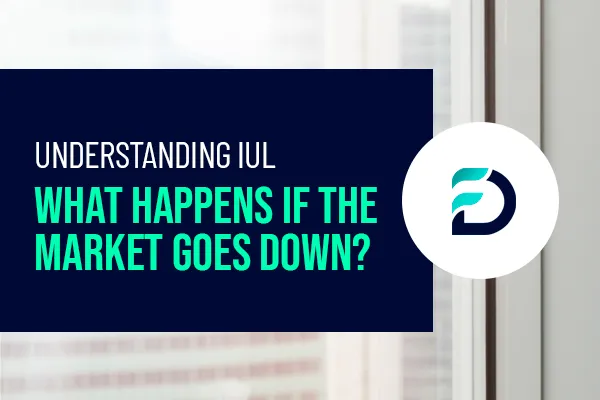Life Insurance Blogs
Life Insurance Blogs

What Happens If the Market Goes Down? Understanding Indexed Universal Life Insurance (IUL) Policies
Navigating Market Volatility with Indexed Universal Life Insurance (IUL)
In today's uncertain financial landscape, many individuals are seeking insurance policies that offer flexibility and the potential for growth without the risk of losing money. Indexed Universal Life Insurance (IUL) is one such option that provides the opportunity to experience the upsides of the stock market while minimizing risk. In this article, we will explore what IUL is, how it works, and how it can protect your investments in a down market.
How Does Indexed Universal Life Insurance Work?
Basically, when you pay a premium into your IUL policy, a portion of it is used to cover the cost of insurance and any applicable fees. The remaining amount is credited to the policy's cash value account. The cash value in an IUL policy is not directly invested in the stock market but is instead tied to one or more equity indexes.
The interest earned on the cash value is based on the performance of the selected indexes. Policyholders have the option to choose between a minimum guaranteed interest credit or a choice of one or more indexes, or both. The interest credit is added to the policy's cash value either monthly or annually.
If you want to understand exactly what an IUL is, don't forget to read our Ultimate Guide about Indexed Universal Life Insurance Policies
Mitigating Risk in a Down Market
One of the most attractive features of Indexed Universal Life Insurance is the ability to protect your investments in a down market. Unlike direct investments in the stock market, the cash value in an IUL policy is not subject to market downturns. This is achieved through two important facets of IUL: the participation rate and the cap and floor rates.
Participation Rate
The participation rate determines the amount of interest credited to your policy based on the performance of the selected index or indexes. This rate is set by the insurance company and typically ranges from 25% to 125% or more. For example, if the gain of an equity account is 8% and your participation rate is 125%, your account would be credited with 125% of the 8%, resulting in a 10% return.
Cap and Floor Rates
To further mitigate risk, IUL policies incorporate cap and floor rates. The cap rate represents the maximum amount of interest that can be credited to your cash value based on the performance of the selected index. On the other hand, the floor rate is the minimum amount of interest you can earn, even if the selected index experiences negative returns.
For example, if your chosen index has a floor rate of 0% and the index experiences a decline in value, your cash value account will not suffer a loss. Some IUL policies also offer a 1% floor rate, ensuring a positive return even in a down market. The combination of the participation rate, cap rate, and floor rate helps protect your investments from market volatility.
Advantages of Indexed Universal Life Insurance
Indexed Universal Life Insurance offers several advantages that make it an appealing option for individuals looking for both protection and potential growth.
Permanent Life Insurance Coverage
One of the primary advantages of IUL is that it provides lifelong coverage, as long as the minimum premiums are paid. This means that your beneficiaries are guaranteed a death benefit, which is typically tax-free and not subject to probate. Unlike other investment products, IUL offers the dual benefit of life insurance coverage and the potential for cash accumulation.
Market Participation
Indexed Universal Life Insurance allows policyholders to participate in the positive performances of the stock market without directly investing money in it. When the selected indexes go up, the policyholder benefits from the market's growth. This can result in paying less into the policy, a larger death benefit, or using the cash value as an income stream during retirement.
Protection from Market Losses
Perhaps the most enticing feature of IUL is its ability to protect your investments from market downturns. While the cash value is tied to equity indexes, it is not directly invested in the stock market. This means that even if the selected indexes experience negative returns, your cash value account will not suffer a loss. This provides peace of mind and stability during uncertain economic times.
Disadvantages of Indexed Universal Life Insurance
While Indexed Universal Life Insurance offers many advantages, it's important to consider the potential drawbacks before making a decision.
Cap on Returns
One potential disadvantage of IUL is the cap rate, which limits the amount of interest that can be credited to your cash value based on the performance of the selected index. While this protects you from market losses, it can also prevent you from fully participating in large market gains. It's crucial to carefully evaluate the cap rate when considering an IUL policy.
Complexity
Indexed Universal Life Insurance can be complex to understand, especially for individuals who are new to the world of life insurance. It requires a deeper understanding of the mechanics of IUL and the various components that affect its performance. Taking the time to educate yourself on the intricacies of IUL is essential to set realistic expectations and make informed decisions.
Potential Fees
Like any insurance policy, Indexed Universal Life Insurance comes with administrative fees, cost of insurance, and premium charges. These fees can add up over time and significantly impact the cash value of the policy, particularly in consistently down markets. It's important to carefully review the policy's fees and understand their potential impact on your investments.
Conclusion
Indexed Universal Life Insurance (IUL) offers a unique combination of lifelong life insurance coverage and the potential for cash accumulation tied to equity indexes. It provides the opportunity to participate in market growth while protecting your investments from market downturns. However, it's essential to carefully consider the cap rate, understand the complexity of the policy, and evaluate the fees associated with an IUL policy. By understanding the mechanics of IUL and its potential benefits and drawbacks, you can make an informed decision that aligns with your financial goals and risk tolerance.
Remember, Disciples Financial is here to help you navigate the world of insurance and investments. Contact us today to explore how IUL can be a valuable addition to your financial portfolio.
Get In Touch


